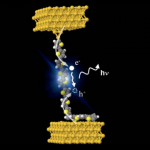
![]() A joint project involving NASA and MIT researchers had demonstrated technology that could supply a lunar colony with broadband via lasers (“faster Internet access than many U.S. homes get”) and has already demonstrated its worth in communications with spacecraft. From ComputerWorld’s article: “The Lunar Laser Communication Demonstration (LLCD) kicked off last September with the launch of NASA’s LADEE (Lunar Atmosphere and Dust Environment Explorer), a research satellite now orbiting the moon. NASA built a laser communications module into LADEE for use in the high-speed wireless experiment. LLCD has already proved itself, transmitting data from LADEE to Earth at 622Mbps (bits per second) and in the other direction at 19.44Mbps, according to MIT. It beat the fastest-ever radio communication to the moon by a factor of 4, 800.” Communicating at such distances means overcoming various challenges; one of the biggest is the variability in Earth’s atmosphere. The LLCD doesn’t try to power through the atmosphere at only one spot, therefore, but uses four separate beams in the New Mexico desert, each aimed “through a different column of air, where the light-bending effects of the atmosphere are slightly different. That increases the chance that at least one of the beams will reach the receiver on the LADEE. Test results have been promising, according to MIT, with the 384, 633-kilometer optical link providing error-free performance in both darkness and bright sunlight, through partly transparent thin clouds, and through atmospheric turbulence that affected signal power.” Read more of this story at Slashdot.
A joint project involving NASA and MIT researchers had demonstrated technology that could supply a lunar colony with broadband via lasers (“faster Internet access than many U.S. homes get”) and has already demonstrated its worth in communications with spacecraft. From ComputerWorld’s article: “The Lunar Laser Communication Demonstration (LLCD) kicked off last September with the launch of NASA’s LADEE (Lunar Atmosphere and Dust Environment Explorer), a research satellite now orbiting the moon. NASA built a laser communications module into LADEE for use in the high-speed wireless experiment. LLCD has already proved itself, transmitting data from LADEE to Earth at 622Mbps (bits per second) and in the other direction at 19.44Mbps, according to MIT. It beat the fastest-ever radio communication to the moon by a factor of 4, 800.” Communicating at such distances means overcoming various challenges; one of the biggest is the variability in Earth’s atmosphere. The LLCD doesn’t try to power through the atmosphere at only one spot, therefore, but uses four separate beams in the New Mexico desert, each aimed “through a different column of air, where the light-bending effects of the atmosphere are slightly different. That increases the chance that at least one of the beams will reach the receiver on the LADEE. Test results have been promising, according to MIT, with the 384, 633-kilometer optical link providing error-free performance in both darkness and bright sunlight, through partly transparent thin clouds, and through atmospheric turbulence that affected signal power.” Read more of this story at Slashdot.
See more here:
Quad Lasers Deliver Fast, Earth-Based Internet To the Moon






 Be honest: when was the last time you opened your iPhone’s Stocks app? Yeah, us neither. Everyone has their own habits when it comes to iOS apps, and fortunately, YouTube user macmixing has posted a wonderful little hack that lets you get rid of any offending stock apps from your home screen— without actually deleting them altogether. Read more…
Be honest: when was the last time you opened your iPhone’s Stocks app? Yeah, us neither. Everyone has their own habits when it comes to iOS apps, and fortunately, YouTube user macmixing has posted a wonderful little hack that lets you get rid of any offending stock apps from your home screen— without actually deleting them altogether. Read more… 